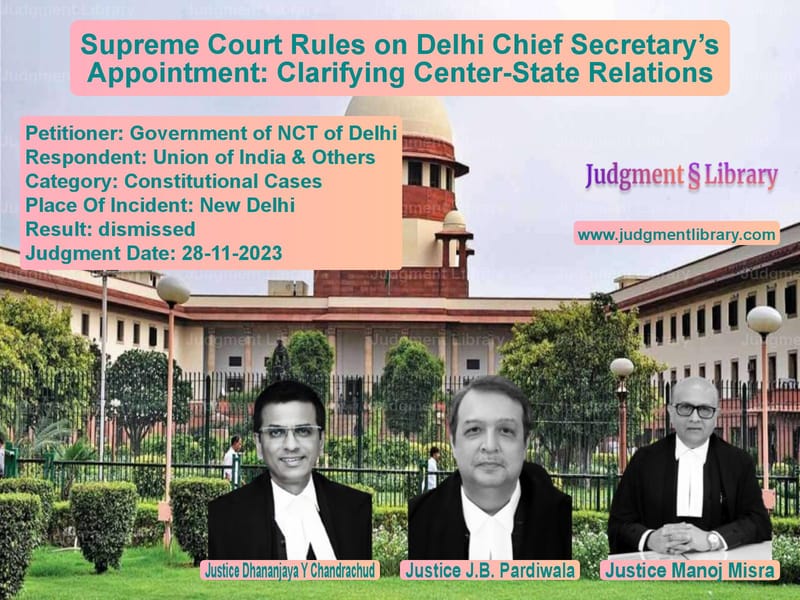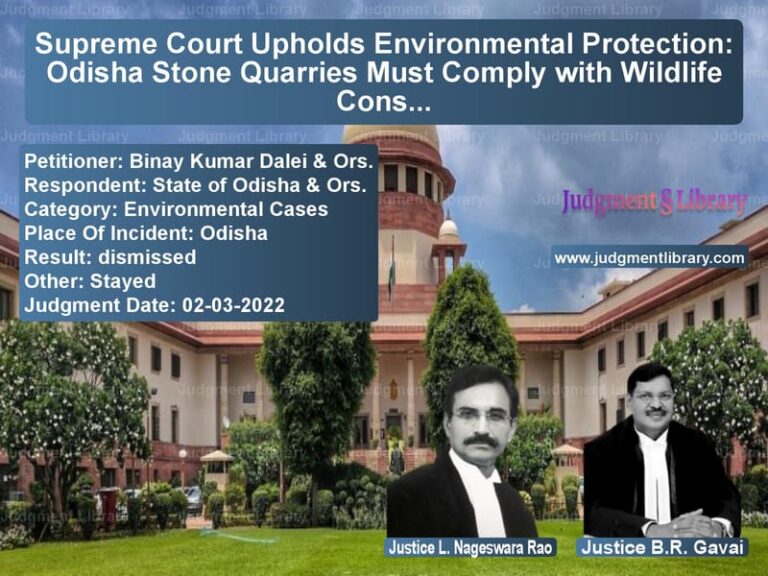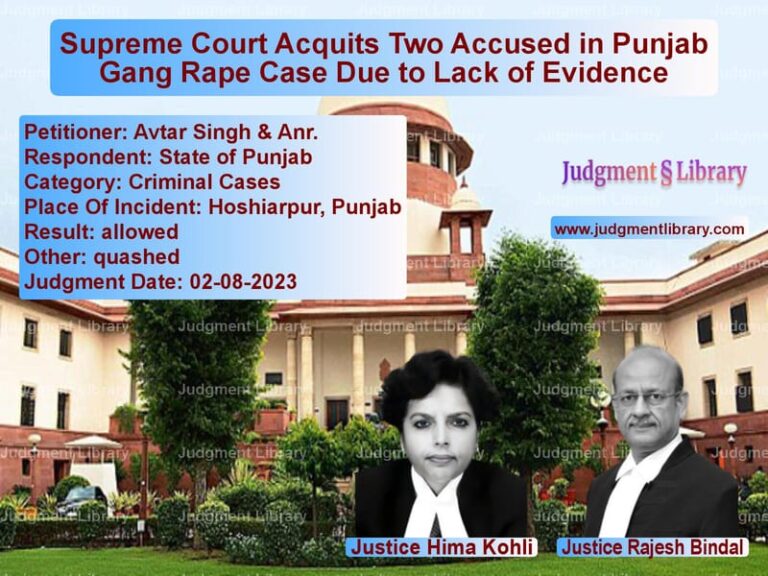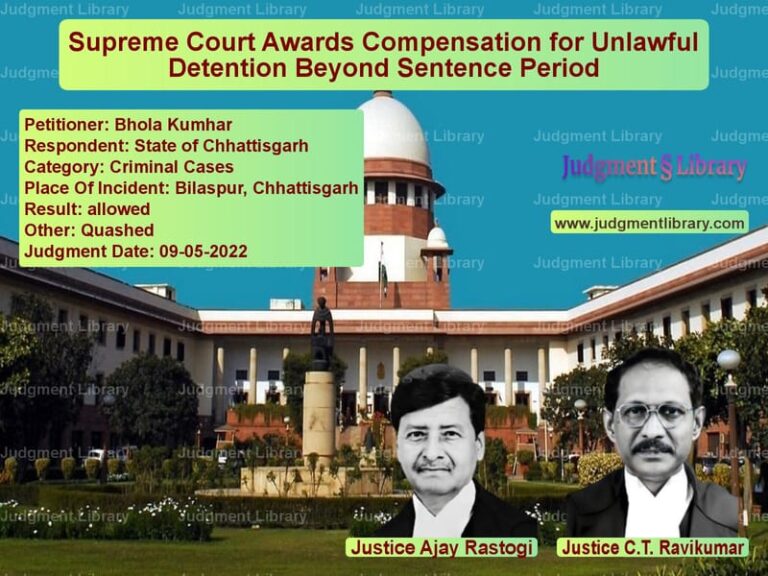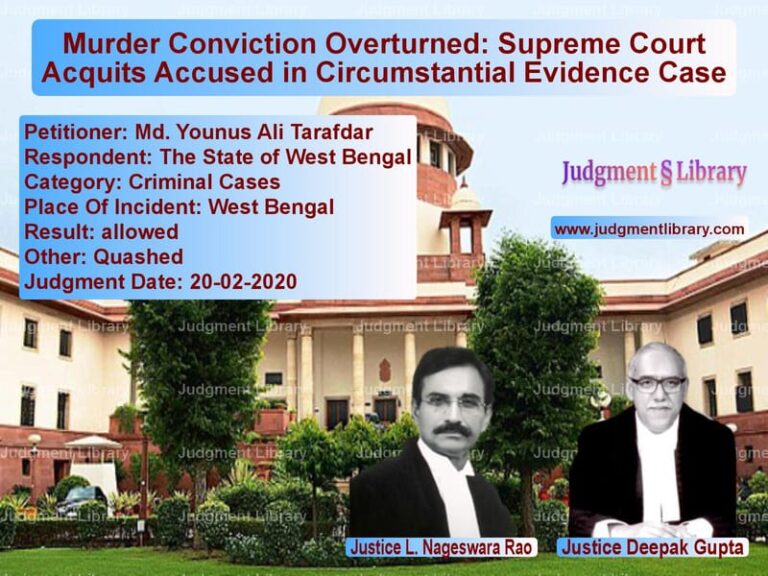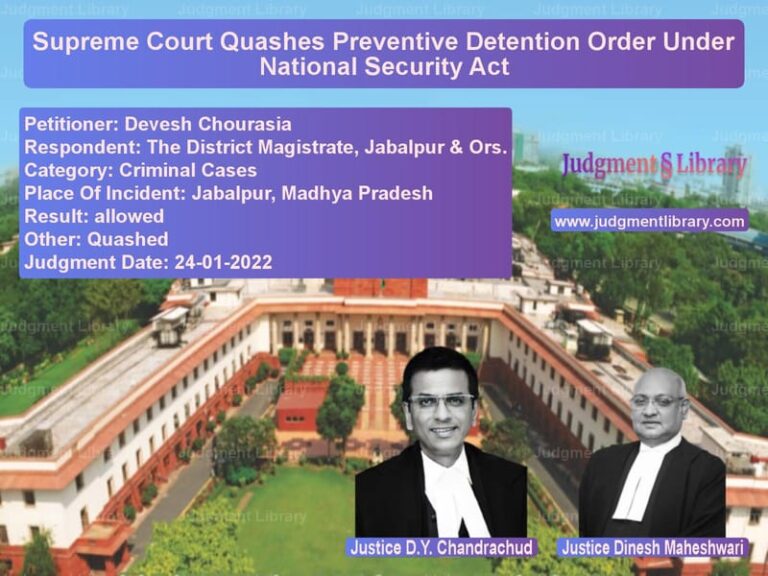Supreme Court Rules on Delhi Chief Secretary’s Appointment: Clarifying Center-State Relations
The case of Government of NCT of Delhi v. Union of India & Others revolves around the appointment of the Chief Secretary of the National Capital Territory of Delhi (NCTD). The Supreme Court was asked to determine whether the Union Government has the unilateral power to appoint or extend the tenure of the Chief Secretary without consulting the Delhi Government.
This case is significant in the ongoing debate over the distribution of powers between the Delhi Government and the Union Government under Article 239AA of the Constitution. The ruling addresses issues of governance, federalism, and executive authority in the capital of India.
Background of the Case
The incumbent Chief Secretary of Delhi was set to retire on November 30, 2023. The Delhi Government approached the Supreme Court seeking:
- A direction restraining the Union Government from unilaterally appointing a new Chief Secretary.
- An order ensuring that one of the five senior-most officers serving in the AGMUT (Arunachal Pradesh-Goa-Mizoram-Union Territories) cadre with experience in the Delhi administration is appointed.
The Solicitor General representing the Union Government informed the Court that the Union Government had decided to grant a six-month extension to the incumbent Chief Secretary.
Legal Issues Raised
The case centered on two main questions:
- Does the Union Government have unilateral power to appoint the Chief Secretary of Delhi?
- Can the Union Government extend the tenure of the incumbent Chief Secretary without consulting the Delhi Government?
Arguments of the Petitioner (Delhi Government)
The Delhi Government, represented by senior counsel Dr. Abhishek Manu Singhvi, argued:
- The appointment of the Chief Secretary should be based on the recommendation of the Delhi Government.
- The power to appoint must be exercised in line with the principles of democratic governance.
- Under Rule 16(1) of the All India Services (Death-Cum-Retirement Benefits) Rules, 1958, an extension to the Chief Secretary can only be granted on the recommendation of the State Government.
- The Chief Secretary plays a crucial role in assisting the elected government in implementing policies, making it essential that the appointment aligns with the state’s interests.
Arguments of the Respondent (Union Government)
The Union Government, represented by the Solicitor General, countered:
- The appointment of the Chief Secretary falls under Entry 41 of the State List, which is excluded from the legislative powers of the Delhi Assembly.
- The Chief Secretary oversees matters beyond the Delhi Government’s control, including public order, police, and land, justifying the Central Government’s role in the appointment.
- The Government of National Capital Territory of Delhi (Amendment) Act, 2023 provides that the Chief Secretary is to be appointed by the Central Government.
- The Transaction of Business Rules, 1993, require the Lieutenant Governor to refer such appointments to the Central Government.
Supreme Court’s Observations
1. Applicability of Article 239AA
The Supreme Court reiterated that under Article 239AA(3), the Delhi Legislative Assembly has legislative powers over all matters in the State List except Public Order, Police, and Land. However, Entry 41 (State Public Services) is not explicitly excluded. This led to debates over whether the Delhi Government had authority over services.
The Court referred to its earlier ruling in Government of NCT of Delhi v. Union of India (2023), where it held that:
“The executive power of NCTD shall extend to all entries in List II and List III, other than the entries expressly excluded in Article 239AA(3).”
2. Executive Authority over Services
The Court clarified that while the Delhi Government has control over most services, the Chief Secretary plays a role in excluded subjects such as police and land. Since the Chief Secretary’s functions extend beyond the Delhi Government’s legislative competence, the Union Government retains authority over the appointment.
3. Precedent on Chief Secretary Appointments
The Court noted that the Central Government had granted tenure extensions to Chief Secretaries in multiple states, including:
- West Bengal (2023)
- Rajasthan (2023)
- Uttar Pradesh (2022, 2023)
- Madhya Pradesh (2022, 2023)
Given this precedent, the Court saw no legal barrier to granting an extension in Delhi.
Final Judgment
The Supreme Court ruled:
- The Central Government has the authority to appoint the Chief Secretary of Delhi.
- The six-month extension granted to the incumbent Chief Secretary is valid.
- The Delhi Government does not have unilateral control over the Chief Secretary’s tenure.
The Court clarified that these findings were based on existing legal provisions and did not preclude future constitutional challenges to the 2023 Amendment Act.
Key Takeaways
1. Strengthening the Role of the Central Government in Delhi
The ruling reinforces the Union Government’s authority over key administrative appointments in the National Capital.
2. Clarification on Executive Powers
The decision highlights that while Delhi’s elected government has substantial autonomy, it does not have exclusive control over administrative services.
3. Setting a Precedent for Future Disputes
The ruling is likely to impact future cases regarding the governance of Delhi, particularly in disputes over control of bureaucracy.
Conclusion
The Supreme Court’s judgment in this case clarifies the extent of Delhi’s autonomy in administrative matters. While reaffirming the Union Government’s authority over the Chief Secretary’s appointment, it leaves open the broader constitutional question of whether the 2023 Amendment Act infringes on Delhi’s governance rights. This issue remains pending before a larger bench.
Petitioner Name: Government of NCT of Delhi.Respondent Name: Union of India & Others.Judgment By: Justice Dhananjaya Y Chandrachud, Justice J.B. Pardiwala, Justice Manoj Misra.Place Of Incident: New Delhi.Judgment Date: 28-11-2023.
Don’t miss out on the full details! Download the complete judgment in PDF format below and gain valuable insights instantly!
Download Judgment: government-of-nct-of-vs-union-of-india-&-oth-supreme-court-of-india-judgment-dated-28-11-2023.pdf
Directly Download Judgment: Directly download this Judgment
See all petitions in Legislative Powers
See all petitions in Public Interest Litigation
See all petitions in Separation of Powers
See all petitions in Judgment by Dhananjaya Y Chandrachud
See all petitions in Judgment by J.B. Pardiwala
See all petitions in Judgment by Manoj Misra
See all petitions in dismissed
See all petitions in supreme court of India judgments November 2023
See all petitions in 2023 judgments
See all posts in Constitutional Cases Category
See all allowed petitions in Constitutional Cases Category
See all Dismissed petitions in Constitutional Cases Category
See all partially allowed petitions in Constitutional Cases Category

